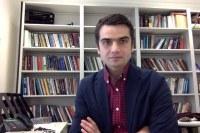Biography
Department/College
Gender Studies (PolIs)
About
My research lies in queer and feminist studies, history of political thought, critical race studies, and Marxist theories of labour.
My first book, Shame: A Genealogy of Queer Practices in the Nineteenth Century, was published in Edinburgh University Press’ Take on the Political Series in May 2017. The book's key intervention in the fields of political theory and history of sexuality is to extend Jacques Rancière’s understanding of “politics” to nineteenth-century feminist activism. Also, this monograph provides a radical reframing of shame as a vital impetus of queer feminist activism.
I am presently working on two new book projects. The first one is titled Sexual Horror and the Invention of a New Future. Turning to the work of queer feminist and critical race theorists ranging from W.E.B. Du Bois to Lauren Berlant, Fred Moten and Sara Ahmed, it shows that horror became a key mechanism to produce a global history of white heteronormativity. In illuminating that whiteness produces distinct historical types of sexual monsters, the book draws on various archives from early American documents and political theory to film studies and the history of socialism. In particular, it is focused on a major conceptual shift. Late eighteenth century and early nineteenth century became a turning point in global history when Europeans have started to speak from the position of the slave, as they were “slaves” to various coercive figures. In analyzing what led to this change in vocabulary, I claim that the new conceptual frame draws on a new understanding of sexual terror. From exclusively terrifying, blackness and indigeneity were marked as sexually exciting. The payoff of the book is to suggest that a new future can be re-imagined by elaborating tactics to break the frame of white monstrosity.
The second book project, tentatively titled How Queer is Socialist Realism? investigates the production of films and literature in Eastern Europe (particularly in Romania) between 1950 and 1970. By de-centering a history of anti-communist narratives, it identifies hidden possibilities in a genre such as socialist realism, which is generally regarded as ideological trash. In analyzing erotic dynamics between older and younger party activists, communist children, and enraged peasants, it suggests that socialism was a project that offers an exciting history and an unrecognized queer future.




